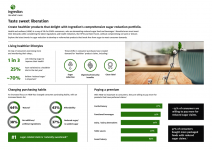PHE sugar scheme will cut obesity rates…if all goes to plan, finds study

Researchers at Oxford University have estimated the effects of Public Health England (PHE)’s sugar reduction strategy on child and adult obesity, related diseases, and healthcare costs, in England.
PHE’s scheme challenges food manufacturers to reduce the sugar content of certain high-sugar products, such as cereals and confectionery, by 20% by 2020.
The strategy comprises three sugar reduction methods: reducing portion size, shifting sales from high-sugar products to low-sugar alternatives, and reformulating products to reduce sugar content.
As until now, the potential health impacts of this strategy had not been studied, a team of researchers at Oxford University has done just that. Their results were published in the British Medical Journal earlier this week.
“The main driver is that we have sugar consumption in the population – in both children and adults – that is too high, and that is contributing to the overweight and obesity epidemic,” said Ben Amies-Cull, who led the research group at Oxford.
“There has been lots of research done on individual approaches to helping obesity, such as encouraging people to lose weight, to eat better or do more exercise. However, this approach is slightly novel in that it targets risk while avoiding the very difficult nature of getting people to change their behaviour and maintain that change.”
The researchers used data from the National Diet and Nutrition Survey (2012-3 and 2013-4) to simulate a scenario where the programme had been successfully implemented in England, which enabled them to estimate changes in weight and resulting impacts on disease burden and healthcare costs.
Obesity levels down, NHS savings up
The study concludes that the UK government’s sugar reduction scheme could reduce the burden of obesity and related disease in England.
In terms of average calorie reduction, the scheme could see 4- to 18-year-olds reduce intake by 25 kcal per day, and 19 kcal per day for adults.
Childhood obesity affects one in 10 children aged 4-5 years and one in five children aged 11-12 years.
The proportion of obese adults has risen from 15% in 1993 to 26% in 2016.
For obesity rates, this could mean a reduction of 5.5% in younger children and adults. For children aged between 11 and 18 years, obese population rates could drop by approximately 2.2%.
In addition, PHE’s initiative could significantly reduce obesity-related illness in adults, with findings suggesting that over the course of 10 years, more than 150,000 cases of type 2 diabetes could be prevented. The same could be said for 6,000 cases of cirrhosis and colorectal cancer, accounting for savings to the National Health Service (NHS) in England of £286m (€331m).
However, the success of the UK’s sugar reduction programme relies on reductions in sugar levels and portion sizes having no ‘unanticipated changes’ in eating patterns or product formulation.
Uncertain behaviour
The researchers warn that if the scheme fails to have intended effects, the aforementioned health benefits could be lost. “There are slight uncertainties in the research which need monitoring in the real world when this policy is implemented,” confirmed Amies-Cull.
That could transpire if, for example, a consumer changed their behaviour in response to modified sizes of processed foods, he explained. “When you reduce the size of a product, people may simply eat more of that product over time.”
Another uncertainty relating to consumer behaviour, and more specifically digestive behaviour, concerns how humans absorb sugar.
“It is thought that when you take calories out of a product in the form of sugar, bodies may not detect that change in calorie intake. But we don't know that for sure yet,” Amies-Cull told this publication.
In other words, when we eat sugar, our bodies may not recognise it as calories in the same way it recognises other calories from foods – which contributes to weight gain, he continued.
“So if you eat a piece of cake that contains 100 calories, but 20% of those calories come from sugar, your body may only detect the 80% that weren't sugar. That is not completely confirmed in the research and there is a lot of debate about it. But it is something we need to bear in mind when monitoring the impacts of the strategy."
Turning to industry behaviour, we need to focus on how industry is reformulating products to reduce sugar content, “in terms of marking sure their products are still commercially successful, while reducing their sugar contents,” said Amies-Cull.
PHE has specifically asked food manufacturers not to replace the calories lost in sugar with other calories, such as saturated fats, for example, “which are also known to be damaging to health”.
“And indeed, if manufacturers end up adding salt, then that will essentially follow a different route to similar negative health outcomes,” he continued.
“I hope these findings underline that the food system does have a hugely important role to play in determining our health that we can't otherwise address from within the traditional approaches of the health system” – DPhil student Ben Amies-Cull, Oxford University
Is voluntary legislation enough?
As it stands, PHE’s industry recommendations to reduce sugar content are voluntary.
One way to ensure sugar-added food items are reformulated as intended would be to bring in legally-binding legislation, which Amies-Cull said could well receive public support.
“Industry may be looking to avoid hard legislation, and they are going to need to meet these obligations strictly in the sugar reduction to avoid that. Public pressure is falling down against sugar and I think the government could have a lot of public support to legislate if this approach isn't successful.
“But as long as these companies are still trying, we still have hope it could be successful overall.”
Source:
The British Medical Journal (BMJ)
Published online: 17 April 2019
‘Estimating the potential impact of the UK government’s sugar reduction programme on child and adult health: modelling study’
DOI: https://doi.org/10.1136/bmj.l1417
Authors: Ben Amies-Cull, Adam D M Briggs, Peter Scarborough

























